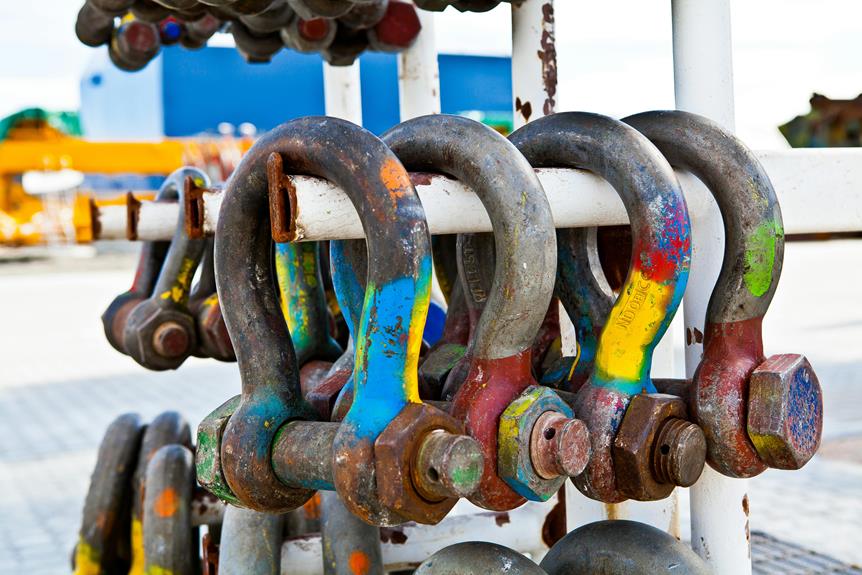When it comes to heavy-duty projects, choosing the right bolt is crucial for ensuring the structural integrity and longevity of your work.
The selection process involves many factors, from strength and durability to corrosion resistance and material composition.
But what truly sets the best bolts apart lies in their ability to withstand extreme conditions and provide a secure hold that you can rely on.
Understanding these key elements will not only save you time and money but also give you the peace of mind that your project is built to last.
Strength and Durability
When selecting a boltbã³l for heavy-duty projects, your top priority should be ensuring its strength and durability. The strength of the boltbã³l is crucial in bearing heavy loads without breaking or getting deformed. Opt for boltbã³ls made from high-quality materials like stainless steel or alloy steel, as these offer superior strength compared to regular steel bolts. Additionally, consider the boltbã³l's durability, which is essential for withstanding wear and tear over time. Look for bolts with proper coatings or treatments to enhance their resistance to corrosion and other environmental factors.
To ensure the boltbã³l meets the required strength standards, check for markings such as grade markings on the head of the bolt. These markings indicate the strength level of the bolt, with higher grades representing stronger bolts. Remember to choose a boltbã³l with the appropriate size and thread pitch to ensure a secure fit in your heavy-duty project. Prioritizing strength and durability in your boltbã³l selection will guarantee the reliability and longevity of your project.
Corrosion Resistance
To enhance the longevity of your heavy-duty project, prioritize selecting a bolt with high resistance to corrosion. Corrosion can weaken the structural integrity of bolts over time, leading to potential safety hazards and costly replacements. Opting for bolts that are specifically designed to resist corrosion ensures that your project remains sturdy and reliable in harsh environments.
Stainless steel bolts are a popular choice for their exceptional corrosion resistance properties. They contain chromium, which forms a protective layer on the surface when exposed to oxygen, preventing rust and corrosion. Another excellent option is galvanized bolts, which are coated with a layer of zinc to shield the metal from corrosive elements.
When choosing bolts for your heavy-duty project, consider the environmental factors they'll be exposed to, such as moisture, chemicals, or saltwater. Selecting bolts with a high corrosion resistance rating will help maintain the structural integrity of your project for years to come, reducing the need for frequent replacements and ensuring long-term durability.
Material Composition
For heavy-duty projects, ensuring the right material composition of bolts is vital to their overall performance and durability. The material from which bolts are made can significantly impact their strength, resistance to corrosion, and ability to withstand heavy loads. Common materials used for bolts include stainless steel, carbon steel, and alloy steel.
Stainless steel bolts are known for their excellent corrosion resistance, making them suitable for projects exposed to harsh environments. Carbon steel bolts are cost-effective and offer good strength, but they may be more prone to rusting without proper coating. Alloy steel bolts are often used in high-stress applications due to their superior strength and toughness.
When selecting bolts for heavy-duty projects, consider factors such as the environment in which the bolts will be used, the required strength, and the budget constraints. Choosing the right material composition ensures that the bolts can withstand the demands of the project and contribute to its overall success.
Thread Type Considerations
Considering the thread type is crucial for selecting the right bolts for heavy-duty projects. The thread type determines how the bolt interacts with the material it's being fastened into and plays a significant role in the overall strength and stability of the connection. When choosing bolts for heavy-duty projects, you need to pay close attention to whether the threads are coarse or fine.
Coarse threads are ideal for projects where speed and ease of installation are priorities. They offer quicker assembly and are less likely to cross-thread during installation. On the other hand, fine threads are better suited for applications where high clamping force is required or in materials that are more brittle. They provide better resistance to loosening due to vibrations, making them suitable for heavy-duty machinery or structures.
Understanding the differences between coarse and fine threads will help you make informed decisions when selecting bolts for your heavy-duty projects. Make sure to consider the specific requirements of your project to choose the thread type that will provide the optimal performance and durability.
Head Styles for Heavy-Duty Projects
When selecting bolts for heavy-duty projects, understanding the various head styles is key to ensuring optimal performance and reliability. The head style of a bolt plays a crucial role in its functionality and suitability for specific applications. Here are some common head styles that are ideal for heavy-duty projects:
- Hex Head: Hex head bolts are widely used in heavy-duty applications due to their ease of use with standard wrenches and sockets. They provide a good grip for tightening and loosening, making them a popular choice for construction and industrial projects.
- Flange Head: Flange head bolts have a built-in washer under the head that distributes the load and provides a larger surface area for better clamping force. This design is beneficial for heavy-duty projects where vibration resistance is essential.
- Socket Head: Socket head bolts have a cylindrical head with a hexagonal recess for an Allen key. These bolts offer high strength and are commonly used in machinery and automotive applications where space is limited.
Choosing the right head style is crucial for the success of your heavy-duty projects. Consider the specific requirements of your project to select the most suitable head style for optimal performance and durability.
Sizing and Length Selection
Selecting the appropriate size and length of bolts is crucial for ensuring the success of your heavy-duty projects. When it comes to sizing, make sure to match the diameter of the bolt with the size of the hole you're working with. Using a bolt that's too small may not provide the necessary strength, while using one that's too large could lead to difficulties during installation.
It's essential to consider the thickness of the materials you're joining to determine the appropriate length of the bolt. The bolt should be long enough to securely hold the materials together without being too short or sticking out excessively.
Remember to take into account any additional components like washers or nuts that will also be part of the assembly. Ensuring the right size and length of bolts are used in your heavy-duty projects will contribute significantly to the structural integrity and longevity of your work.
Frequently Asked Questions
How Do Bolt Coatings Affect Their Performance in Heavy-Duty Projects?
When working on heavy-duty projects, bolt coatings play a crucial role in performance. They can enhance durability, prevent corrosion, and improve overall strength. Choosing the right coating ensures your bolts can withstand demanding conditions and maintain structural integrity.
Are There Any Specific Bolt Grades or Classifications That Are Recommended for Extreme Heavy-Duty Projects?
When working on extreme heavy-duty projects, it's crucial to use specific bolt grades or classifications. These are recommended for their strength and durability, ensuring your project's success. Make sure to select the right ones for the job.
Can Using Different Types of Washers or Nuts Affect the Overall Strength and Durability of Bolts in Heavy-Duty Applications?
Using different types of washers or nuts can indeed affect the overall strength and durability of bolts in heavy-duty applications. Ensure compatibility and quality to maintain structural integrity and safety in your projects.
What Are Some Common Mistakes to Avoid When Choosing Bolts for Heavy-Duty Projects?
When choosing bolts for heavy-duty projects, avoid common mistakes like underestimating load requirements, using incorrect materials, neglecting proper torquing procedures, and overlooking environmental factors. These oversights can compromise safety and project integrity.
Are There Any Special Installation Techniques or Tools Recommended for Ensuring the Maximum Strength and Reliability of Bolts in Heavy-Duty Applications?
To ensure maximum strength and reliability of bolts in heavy-duty applications, use proper installation techniques and recommended tools. Tighten bolts securely according to specifications and consider using thread-locking compounds for added security and durability.
Conclusion
In conclusion, when it comes to heavy-duty projects, the best bolt for the job is one that offers exceptional strength and durability, corrosion resistance, and the right material composition.
It's important to consider the thread type, head style, sizing, and length to ensure a secure and reliable connection.
By choosing the right bolt for your specific project needs, you can ensure a successful and long-lasting outcome.








